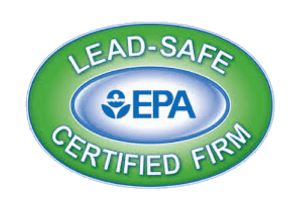Hiring and Contracting with a Professional
Before you decide to hire the least expensive painter you can find, or “do it yourself”, here are important points to consider that suggest the lowest price may not be the best value.
Safety:
Painting can be hazardous work, whether it’s working on a ladder or dealing with solvents and dust.Hiring a professional contractor means you don’t have to worry about these problems.
Health:
If your home or business was built before 1978, it may have been painted with lead-based paint, which can cause serious health effects when it is scraped or sanded in preparation for repainting.Professional contractors will take appropriate steps to protect you. Painting contractors are required to furnish EPA-produced pamphlets to their residential customers before they begin a job that involves disturbing lead-based paint in or on a residence. Professional painting contractors will understand and be willing to follow the recommendations on this pamphlet.
Preparation & Painting:
Getting the surface properly prepared makes all the difference. Professional contractors know thevalue of preparation and will do it right.
Knowing Paints and How to Apply Them:
The choices today are more complicated than just oil or latex, and professional contractors will know what works, how to use it, and will have the right tools for the job. Professional contractors utilize and partner with professional paint, coatings, and wallcovering suppliers.
Cleanup and Disposal:
Hiring a professional contractor means you don’t have to worry about dealing with paint residues andother leftovers. Professionals will know how to handle hazardous wastes that may be part of the job.
How to Choose the Right Contractor for Your Project:
Once you have decided to contract with someone to do a particular painting and decorating project, how do you go about selecting the right company? Do you make your selection on price, size of company, years in business, or other criteria? To locate the names of reputable contractors, there are many sources of information. Some of these sources are PDCA’s Find a Pro search engine, friends, relatives, architects and design professionals, and local “quality- oriented” paint supply stores. However, these sources can only give you limited general information. In order to make an educated decision, you need some specific information about any person or firm you are considering hiring.
Always verify the contractor is licensed and insured:
Quality contracting firms will be only too happy to provide you with copies of their certificates ofinsurance. They should provide bonding information (if the job is large enough to require such) anddocumentation of safety training and compliance programs. Not all states and municipalities requirelicensing however business registration with your state and municipality is generally a minimumrequirement.
Written Contracts are a Must:
Reputable contractors will encourage the use of a written contract. This contract should clearly explain the scope of the work to be performed. It should also cover such items as surfaces to be painted, methods and extent of surface preparation, time schedules for the project, and payment procedures. Knowing the total scope of the work enables you to carefully evaluate the different bids you may receive
with the proper information and keep them on a level playing field. The contract serves to protect both you and the contractor.
Invest Time in Verifying References:
Obtain a list of references from the prospective contractor. This list should include the contact person, address, and telephone number of the previous client. Follow up on this list with a phone call. Remember, the contractor will not give you a bad reference. Therefore, ask references if they know of any other work this contractor has performed. Be sure to ask whether the contractor and employees treated you professionally and with respect. The references you are interested in should be projects similar in size and scope to yours. Also, some of the projects should be at least a few years old. This will help you gauge the performance of the construction and materials used. If possible, try to see the work that was done. Discuss any guarantee or warranty programs the contractor may offer. Ask about the manufacturer’s warranty on the products to be used on your project. Remember you are looking for long-term durability from the paint job. The use of high quality products is as important as the selection and performance of the contractor. Verifying references will provide a return on your project investment.
Is Your Contractor a PDCA Member?
Determine if your contractor is a member of the Painting and Decorating Contractors of America. It has been in existence since 1884 and has over 3000 members all over the country and parts of Canada. The focus of the association is the education of its members and the promotion of professionalism within the industry. Look for the PDCA logo on your contractor’s business card, bid sheets, or trucks. The PDCA offers many programs for the education of painting contractors. This education includes training in the area of safety, business management, technical areas of painting and surface preparation, and more. Quality painting and decorating contractors are well educated on the different aspects of any painting project and that knowledge helps eliminate surprises.
Excellence in paint application is as important with your selection of a contractor as are the skills toproperly manage their business and your project.
Not all Memberships Associations are alike:
National Associations such as PDCA and the Better Business Bureau are Non-Profit Associations who are interested in making the contracting world better, not just selling their products, which many marketing and sales type groups are in business for. PDCA is the only national association for painting and decorating contractors and one of the oldest contractor associations in America. Industry standards are another benefit of industry associations. PDCA produces nationally recognized Painting Industry Standards that cover many different aspects of a painting project. Use of these standards in proposals and contracts helps improve communication between the client and the contractor, assists in ensuring quality, and becomes a basis for evaluating the job’s requirements.
In Closing:
Good contractors are very eager for your business. They are also very proud of their craftsmanship. Once you have made your selection, step back and give the professional room to execute the project. You have both done your homework, so give the professional the opportunity to meet and exceed your expectations. Remember, as with anything else in life, you get what you pay for. If you want high quality and reliable service, be willing to pay the price that comes with it. Here’s to your successful painting projects. The Painting and Decorating Contractors of America is a full-service national trade association representing over 3,000 companies engaged in all sectors of the coatings application industry. PDCA has developed this article to assist you in making an informed decision when you next contemplate a painting or decorating project.
To find a PDCA contractor in your area, visit the PDCA Find-a-Pro Search Engine on www.pdca.org, or call PDCA at 800-332-PDCA.
© Copyright 2005 PDCA All Rights Reserved. Painting & Decorating Contractors of America










